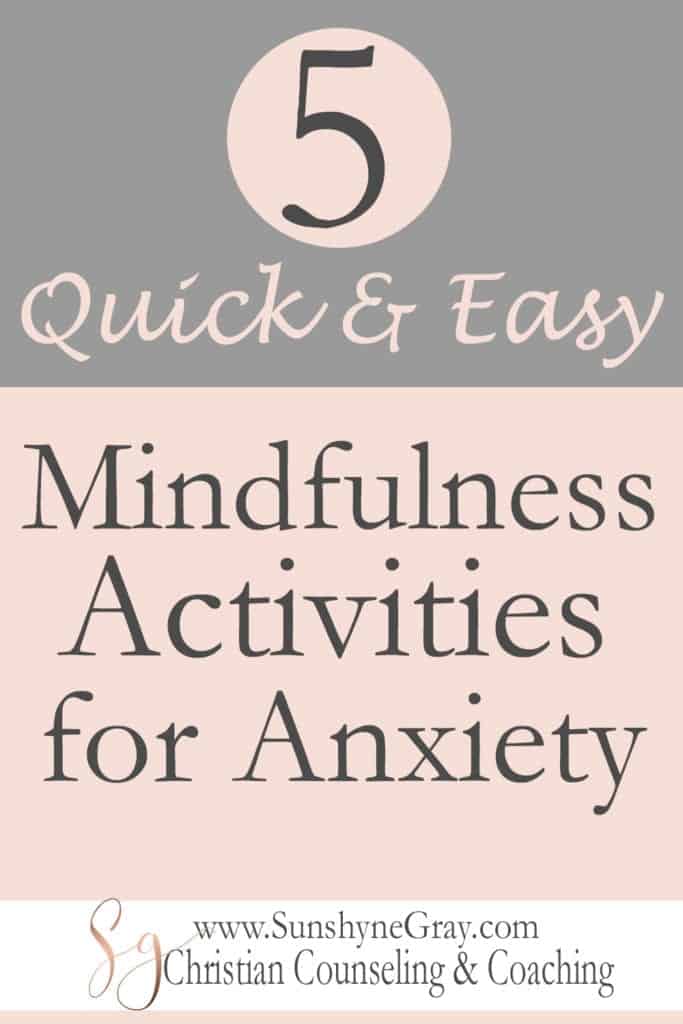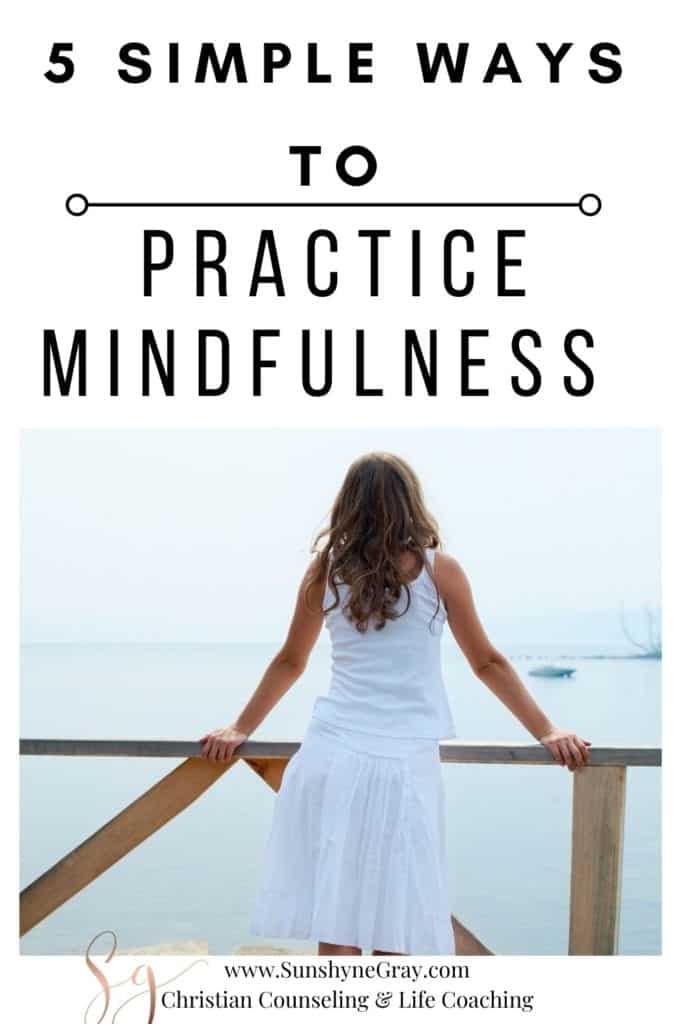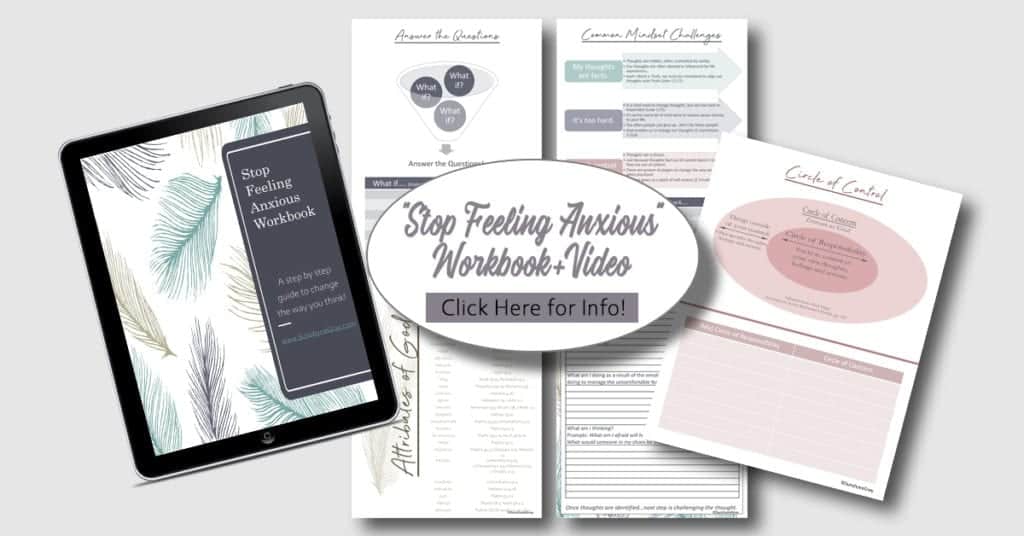How to Practice Mindfulness for Anxiety

In this article you are going to learn what mindfulness is and how to practice mindfulness for anxiety relief. Also, I am going to outline some mindfulness activities to help get you started. Don’t forget to get the free printable PDF of the list!
What is mindfulness?
Mindfulness is simply the act of putting one’s focus on the present moment.
Can Christians practice mindfulness?
In a word, yes! Mindfulness is a buzzword that can be misunderstood as new age practices. However, there is great benefit and practicing mindfulness, especially for anxiety. While the Bible may not use the word “mindfulness”, it does endorse the practice of it!
Be still, and know that I am God… Psalms 46:10
I find, it’s in the quiet, still moments that I grow spiritually and personally. Mindfulness allows us to pay attention to what’s going on beneath the surface. Awareness of emotions and thoughts allow for identifying the needed areas of refinement. This is especially the case when we sit prayerfully before God, allowing His love, wisdom and grace to wash over us.
I would even argue that the Bible promotes mindfulness. Scripture warns that we stop dwelling on the past.
Forget the former things; do not dwell on the past. Isaiah 43:18
We are also told to stop worrying about tomorrow…
“So don’t worry about tomorrow; for tomorrow will bring its own worries. Today’s trouble is enough for today. Matthew 6:34
Finally, in the gospels, Jesus withdraws many times to find a quiet place to be still and unhurried before God (Mark 6: 46, Mark 14:32, Mark 3:7, Matthew 14:13).
In conclusion, mindfulness is an effective practice for everyone, including Christians.

Is mindfulness effective for anxiety?
Mindfulness is a very helpful tool when struggling with anxiety. Anxious thoughts tend to be focused on future events. There’s a tendency to loop on anxious thoughts – we get a case of the “what ifs”. Fear of the unknown and how things will turn out in any given situation can lead to anxiety.
Mindfulness for anxiety brings us back to the present. It is the ability to focus our attention to right now, rather than the future. Consequently, we can’t worry about later and focus on the now at the same time. In other words, you can only think one thought at a time. You have to choose one! Which will you choose?
Are you sold on mindfulness yet?
How to practice mindfulness for anxiety…
I am not going to pretend this is an easy task – being mindful. Admittedly, it’s an area I could strengthen in my own life. Our society is fast paced. Information is constantly changing. Social media is always reminding us of breaking news. Cell phones beep at every turn. Not to mention over pack schedules keep us on the move.
Constant distraction hinders mindfulness!
4 Simple Steps to Practice Mindfulness for Anxiety
1. Choose to be still.
2. Be purposeful by carving out time (even short intervals).
3. Make a plan for mindful moments with specific activities.
4. Practice mindfulness throughout the day… even short moments add up.
The biggest challenge I face when trying to practice mindfulness is stopping my thoughts. My body is still, but my mind is racing. This is where planned mindfulness activities will prove helpful.

5 Mindfulness Activities for Anxiety
1. Belly Breathe
Lay down and rest something (even if it’s just your hands) on your belly. Watch, listen and feel your breath move in-and-out, up-and-down for 3 deep breaths.
2. C.A.L.M. Feelings
Notice and name sensations (or even emotions) right now in your…
Chest…
Arms…
Legs…
Mind…
3. Heart Beats
Allow your breath to slow down…
Allow your mind to slow down…
Allow your body to become still…
Scan your body until you find the sound or sensation of your heart beat. Focus on that for 10 beats, noticing the sensations of each one, and the space between them.
4. Silent Sighs
Inhale deeply into your belly. On the out breath, quietly and slowly as possible until all the air is released. Try sighing out words, names or phrases that you are stuck on or frustrated about. Let them ease out of you completely on the out – flow of your breathing. Repeat as needed.
5. NAGging Feeling
Notice a feeling, thought or sensation…
Allow it to be there for a moment…
Let it go on the out breath.
Notice what happens to the “nagging” of this experience when you bring mindfulness to it in this way.
All of these ideas and more come from… {Growing Mindful: Mindfulness practice for all ages. (58 card deck) by Mitch Abbott and Chris Willard}
These mindfulness activities for anxiety help bring us to the present. Once our mind is still and quiet, we can begin other ways of managing anxiety. Check out how to stop feeling anxious here. Whether through prayer, scripture writing or journaling, mindfulness is a very effective way to manage anxiety!
Now that you know how to practice mindfulness for anxiety, what would you add to the list? Leave a comment below!

Mindfulness is something I used to shy away from, but the more I learn about it, the more I realize that it’s a word for so many things the Bible tells us to do. Be still and focus on God. Don’t worry about the future. Don’t focus on the past. There are so many verses in the Bible that tell us these things! Love this practical article and all the simple strategies to help us practice being mindful.
I have struggled with meditating on God’s word. These exercises while an audio of psalms or proverbs has become my first step . Thank you.
Interesting post on mindfulness and anxiety. It’s quite easy to slide into anxiousness in our busy and comparison-clad society, so it seems especially important we focus on our loving Father. I love that you started with PS 46:10. Powerful verse!
I love that you wrote in this topic. I feel so many Christians are afraid to accept that “mindfulness” is a good and biblical practice! It can TRULY help combat anxiety. I would add, taking time to be mindful on what you are thankful for, on what God has done in your life, and just simply the fact that Jesus died on the cross for us. Having a heart of thanks and praise is a great way to beat anxiety!
Yes love that we can practice it as Christians…another way to say meditating on the word!